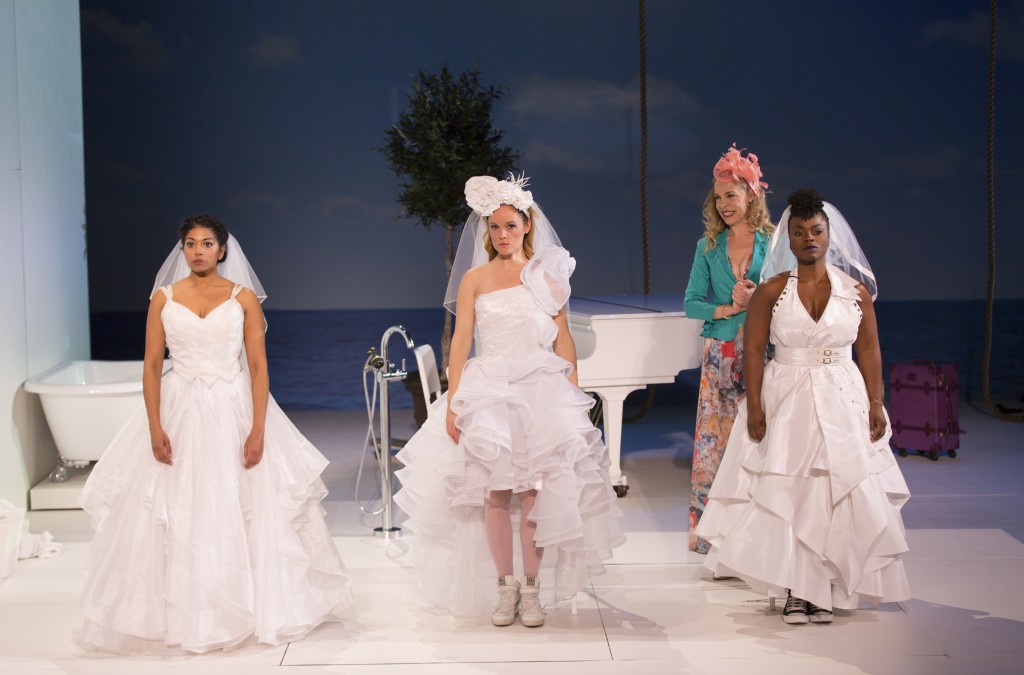The devastating effects of sexism are examined in two fascinating Off-Broadway productions. The playwrights’ styles vary, but they each offer clear-eyed observations on how treating women as inferior can warp society. Frances Ya-Chu Cowhig’s The World of Extreme Happiness at Manhattan Theatre Club takes place in contemporary China and Charles Mee’s Big Love is set in an amalgam of the ancient and modern worlds. In the former, a factory worker attempts to overcome her country’s crushing oppression of rural people in general and women specifically, while the latter updates a classic Greek play about captive brides rebelling against a patriarchal world. Though one depicts harsh reality and the other is based in myths, both resonate powerfully.

Credit: Matthew Murphy
[divider ]REVIEW #1: The World of Extreme Happiness[/divider]
Cowhig’s vision of a brutal system is unsparingly honest. The play opens with an impoverished couple throwing their just born child into the trash because she is female. But her survival is taken as a good omen and she is named Sunny. Flash forward 20 years and Sunny has joined a legion of country workers living in the big city to send money back home. With the new wave of capitalism and the absence of religion, self-help gurus promising wealth through repeated aphorisms flourish. With the aide of such a huckster named Mr. Destiny, Sunny attempts to rise above her degrading janitorial position by entering a contest to become a representative of her factory introducing a flattering documentary film. The playwright inserts a secondary plot about the factory’s autocratic owner and his high-powered female vice-president, but this storyline is confusing and detracts from rather than enforces Sunny’s tale.
Despite this digression, the main thread is intense and harrowing, with inestimable aid from Jennifer Lim’s fierce performance in the lead role and Eric Ting’s tight direction. There is also essential support from Jo Mei as Sunny’s gullible co-worker Ming-Ming, who swallows Mr. Destiny’s silly formulas whole, and Telly Leung as Sunny’s brother Pete, who would rather perform the legend of the Monkey King in tea houses than tend his father’s prized pigeons. In one particularly incisive scene, Cowhig sums up the siblings’ limited options as they play a video game. Zombies eat their video avators’ brains as they scheme to find a way out of their dead-end existence. The brief, powerful sequence encapsulates the lack of choices for Chinese workers, both male and female.
[divider ]REVIEW #2: Big Love[/divider]
While Charles Mee’s heroines in Big Love face a dilemma derived from an ancient Greek text, it’s no less desperate and immediate. Fifty sisters have fled from unwanted contracted marriages to their chauvinist cousins and seek refuge at the Italian villa of prominent businessman Piero. The runaway brides (represented by three onstage siblings) become like political refugees in the modern world as their prospective husbands (also a trio) show up and demand their expected nuptials. Amidst the negotiations, all the characters—including Bella, Piero’s wise mother; Giuliano, his gay nephew; and Eleanor and Leo, a pair of fun-loving houseguests—ruminate on the nature of love, war, sex, and power. In between monologues and debates, there are appropriate musical numbers such as Lesley Gore’s “You Don’t Own Me” and Michael Jackson’s “Thriller.”

Credit: T. Charles Erickson
It seems like an extravagant mess, but somehow it all works. Tina Landau’s masterfully paced and imaginative direction, along with Scott Zielinski’s cinematic lighting and Austin Switser’s art-installation-like projections, manage to combine the bizarre with the real so that even the wild-party finale is anchored in solid ground. There is mayhem, but we know what’s happening and why, and most importantly, we care about the outcome.
The company skillfully creates specific personages rather than archetypes, with special kudos to Rebecca Naomi Jones as the main sister Lydia, Stacey Sargeant as the Amazonian Thyona, Libby Winters as Barbie doll-ish Olympia, Lynn Cohen as the sage Bella, and Preston Sadler as the lonely Giuliano.
The World of Extreme Happiness: Feb. 24—April 5. Manhattan Theatre Club at City Center Stage I, 131 W. 55th St., NYC. Schedule varies. Running time: 90 minutes with no intermission; $85. (212) 581-1212 or www.nycentercity.org.
Big Love: Feb. 23—March 15. Signature Theatre Company, 480 W. 42nd St., NYC. Schedule varies. Running time: 90 minutes with no intermission; $25. (212) 244-7529 or www.signaturetheater.org.
This review has previously appeared on ArtsinNY.com and Theaterlife.com.
